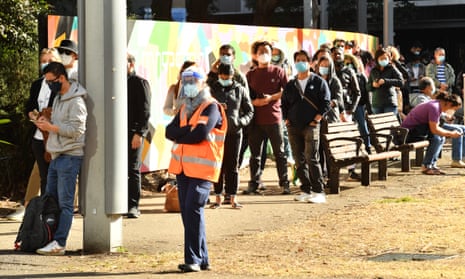In the early months of the Covid-19 pandemic, Australia was lauded by news outlets around the world as a model of how to handle the virus. The country recorded few cases and when there were outbreaks, authorities brought them under control.
A year later, Australia’s management of the pandemic is hitting the headlines for all the wrong reasons.
“One day a rooster, the next a feather duster”, the Financial Times wrote in an editorial lamenting the glacial pace of the country’s vaccine rollout.
“Sydney in lockdown, borders shut and hardly anyone vaccinated. How long can Australia go on like this?” CNN said. The network has also reported on the backlash to Sydney’s graphic vaccine ad, which depicts a young woman – she looks younger than 40, the age limit to be eligible for a vaccine – gasping for air, alone in hospital.
“The fortress cannot hold,” the New York Times reported in a piece warning that, without a much higher vaccination rate, the usual tactics of lockdowns and blanket testing may not be enough.
Two different Washington Post stories quoted Australians outside and inside the country describing themselves as “abandoned” and “prisoners”, and the official response to pandemic as “devoid of reality”.
Article after article cited the damning figure that Australia is last in the OECD when it comes to vaccinations. The rollout has been called “feeble”, “far behind”, “chaos” and a “strollout”.
The Financial Times editorial board wrote in an opinion piece this week: “Having squandered its early victory over the virus, despite being one of the world’s wealthiest countries, Australia now faces a costly round of restrictions as it struggles to protect a largely un-immunised population from outbreaks of the highly contagious Delta variant.”
The piece, titled “Fatal flaws in Australia’s hermit nation strategy (£)”, argued that, “Until now, Australia has enjoyed a glow of global approval for adroitly weathering the crisis with a ‘Covid-zero’ policy of ruthless virus suppression.”
An opinion piece in the Telegraph, which begins “Down Under, the world has turned upside down”, argued that “the situation in Australia flags up a grim fact of the pandemic period that whenever you’re about to breathe a sigh of relief, events have a nasty habit of dashing expectations”.
Much of the coverage pointed out the contradictions in the Morrison government’s response. The Washington Post reported that the French rugby team was allowed into the country at a time when one Australian missed his brother’s wedding, his grandmother’s funeral, and was unable to help his father recover from a post-surgery infection that put him in hospital.
The Post also noted that Australia had moved to “further seal itself off from the world” by halving international arrivals in response to the outbreak.
“There is relatively little chance of catching Covid-19 in Australia but the stakes are high if you do,” wrote the Times of London.
Australian authorities reported a slight easing in new Covid cases in Sydney on Tuesday, but left open the possibility of extending a lockdown in the country’s largest city to douse an outbreak of the highly infectious Delta variant. Authorities also reported the death of a man in his 70s, the second Covid death in the country this year, both during the new outbreak.
The biggest pandemic story within Australia this week is arguably what exactly happened during the federal government’s vaccine negotiations with Pfizer, which produces one of two vaccines Australia recommends as safe for people under 40.
On Sunday night, it emerged that by late June this year, the prime minister Scott Morrison – infamous for declaring that vaccinations are “not a race” – had not spoken directly to Pfizer’s chairman and chief executive, Albert Bourla.
This approach, first reported by the ABC, has been compared with the prime minister having made at least 55 phone calls earlier in the year on behalf of then-finance minister Matthias Corman, who was lobbying – successfully – to become the OECD’s next secretary general.
A source also told the ABC that Australia’s approach to vaccine negotiations with Pfizer was “rude, dismissive and penny pinching”.
Former prime minister Kevin Rudd joined a chorus of ex-Australian prime ministers and opposition leaders in frank condemnation of Morrison’s handling of the vaccine rollout.
It was reported that Rudd – who was prime minister from 2007 to 2010 and again briefly in 2013 – made a phone call that helped pave the way for more civil conversations between Pfizer and the government. Later, Rudd distanced himself from the idea that he had helped in concrete contractual negotiations, releasing a statement saying: “Mr Rudd would definitely not seek to associate himself with the Australian government’s comprehensively botched vaccine procurement program.”
Malcolm Turnbull, who led the country from 2015 to 2018, has described it as a “phenomenal” and “comprehensive” failure.
